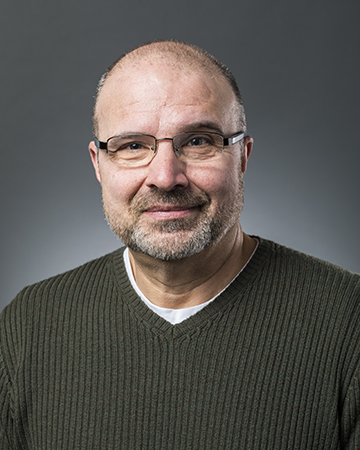
Darrell Owens
Clinical Assistant Professor and Section Head for Supportive and Palliative Care, UW Medicine Northwest Hospital Campus
Nominated by Laura Quinnan, Chief of Medicine, Clinical Assistant Professor, Department of Medicine – Northwest Hospital
Awarded 2019
It is with great pleasure that the Inpatient Medicine Team at UW Medicine’s Northwest Hospital nominates Dr. Darrell Owens for the UW Distinguished Staff Award. As the founder of the Palliative Care Services at both Harborview and Northwest Hospital, for over 15 years, Dr. Owens has been providing palliative care to seriously ill patients and their families within the UW Medicine Health System. He has dedicated countless hours to caring for patients and their families at the end-of-life, as well as having provided clinical education to internal medicine residents, medical students and nurse practitioner students, many of whom are now his colleagues. He is the first and only advanced practice nurse to have started two medical consult services within the UW Health System.
Darrell is the first advanced practice nurse within UW Medicine, and in Washington State to receive the Cambia Health Foundation Sojourn Award for Clinical Excellence and Leadership in Palliative Care. In 2011 the American Association of Nurse Practitioners selected him as Nurse Practitioner of the Year for Washington State based on his work within UW Medicine, and in 2015 the University of Alabama at Birmingham Alumni Associated honored his work with the Joanne Barnett Award for Compassionate Care. Dr. Owens is the only Nurse Practitioner within the UW Medicine to be selected as a Top Doctor and Nurse by Seattle Metropolitan Magazine on four different occasions.
In 2017 due to financial challenges on the Northwest Hospital Campus, the Palliative Care Service underwent a 95% reduction in force. As the only remaining palliative care provider on the campus, Dr. Owens was provided with the opportunity to close the outpatient program and focus all of his efforts on the inpatient consult service. This would have required discharging approximately 30 frail, elderly homebound patients whose only access to healthcare would be via 911 and the Emergency Department. Rather than abandon these patients, Dr. Owens created a plan that allowed him to continue to care for the homebound patients (providing primary and palliative care), to care for people with advanced cancer at the Seattle Cancer Care Alliance on the Northwest Hospital Campus one day per week, and to continue to provide hospital coverage 7 days per week while at the same time improving the financial performance of the program.
Although he is a practice of one, Dr. Owens is always available to help his hospitalist colleagues. He now admits and manages all inpatient hospice patients (something they were previously required to do), helping to reduce their workload and improve continuity of care. His caring and compassion is at times beyond comprehension. One example includes caring for families one a loved one dies. The normal process for when a patient dies in the hospital is that the nurse on duty notifies the family. Often, as is in the case of night shift, the nurse has not likely met the family. Rather than having a nurse who does not know the family call and inform them of their loved one’s death, Dr. Owens leaves instructions that he is to be called 24/7 so that he may call and tell family of the death. He believes that this emotional news should come from someone they know, rather than a stranger. There have been many weeks when Dr. Owens has been awakened several nights in row. He believes losing sleep does not compare to losing a loved one. After a patient death, Darrell sends a hand-written card and note to every family.
In Summer 2018, when a patient required frequent medication dosing to manage respiratory distress, Dr. Owens set at the bedside for over 2 hours, giving them medication every 15 minutes until symptoms were controlled. When a colleague’s elderly mother (who was also his patient) came to the emergency room for difficulty breathing late on a Friday night, Dr. Owens met them in the emergency room and sat with the daughter until her mom was well enough to be discharged the next morning. When one of his patients on hospice ran out of pain medication on a Sunday, he personally drove a prescription to their local pharmacy. These examples are but a few of the many incredible ways that Dr. Owens represents the vision and values of the University of Washington.
The Inpatient Medicine Team at UW Medicine’s Northwest Hospital is honored to nominate Darrell Owens, and incredibly grateful to be able to call him our colleague.